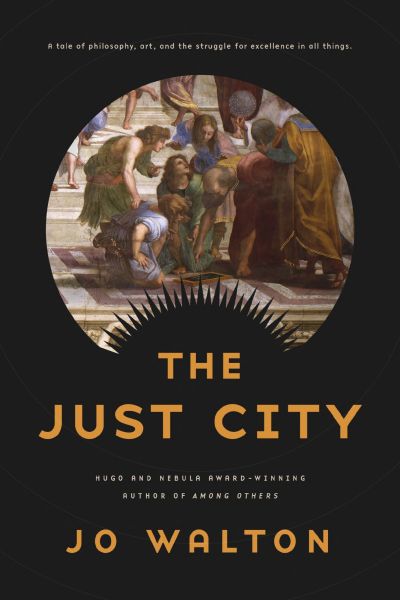Up There In Utopia
The Just City (Thessaly, volume 1)
By Jo Walton

29 Aug, 2024
2015’s The Just City is the first volume in Jo Walton’s Thessaly trilogy.
Astonished to discover that some of the women who flee from him flee because they most sincerely do not want to have sex with him, the god Apollo partakes in a social experiment with his wiser sister Athene. They will set up Plato’s Just City and see how it plays out.
Athene prudently remains a god. Apollo, wanting to better understand the human condition, willingly becomes a mortal for the duration of a lifetime.
Aware that mortals are, well, mortal, that nothing involving mortals lasts forever, and also that she is greatly constrained in where she can locate the Just City without causing undue disruptions to the time stream, Athene sites the Just City on Kallisti. Kallisti, known to us as Thera, is slated for volcanic obliteration in 1600 BC. There will be no evidence left of the Just City save for the legends that will inspire Plato’s vision of Atlantis.
A city needs its people. Children are retrieved from various deplorable fates. They can be raised to embrace the precepts of the Just City. Teachers are more problematic, as by necessity they must be adult, thus raised outside the Just City. Athene recruits these from her worshippers through time. Cities also need their uncompensated, involuntary workers. Slaves being incompatible with the Just City, Athene acquires highly advanced robots from an era she disdains. These being mere machines, they will not complicate matters with personhood. Or so Athene believes.
Once the plan is put into action, complications ensue.
One of the main problems is that the Just City is in no sense a blank slate. The adults are products of their time. Rescued orphans like Simmea and Kebes are old enough to remember and be marked by the traumatic events that preceded their rescue.
Also Apollo is not as adept at being mortal as he would like to be. And Athene should have read the service manuals on the robots more closely than she actually did.
All these problems cannot be ignored, thanks to keen-witted observer and questioner Sokrates, who was snatched from time just prior to his execution.
~oOo~
This book was a poor fit for me. I have a low tolerance for works that feature sexual assault. This sensitivity would make anything set in Bronze Age Greece a poor fit, consent not being a significant consideration at that time (especially for gods). If this hadn’t been a commissioned review, I’d have stopped reading very early on.
In the novel’s defense, we’re not talking rape as plot parsley. Nor is the author imitating George R.R. Martin, attempting to make dragons plausible by adding lots of sexual assault in the name of historical accuracy. The events are period and culture appropriate; they fit the general themes of the novel. I may not like the sexual assault bits, but I cannot argue that they irretrievably taint the book. If you don’t mind them, you may find the book a well-written intellectual adventure.
I note that the same pantheon whose orchestration of the Trojan war was such an unparalleled example of military efficiency has created a utopia whose wheels fall off as soon as the key is inserted into the starter. In the gods’ defense, Athene is explicitly aware that mortal projects are, well, mortal, while Apollo is a himbo with the depth of an oil slick. The Just City is pretty clearly unworkable under the constraints of its creation. The only real question is which fault line will give away first.
The book is competently done, but the way failure is baked in, from the Just City’s governing creed to the selection of the population, made me wonder about the point of this project. I presume my question is answered in the two sequels1.
The Just City is available here (Amazon US), here (Amazon Canada), here (Amazon UK), here (Apple Books), here (Barnes & Noble), here (Chapters-Indigo), and here (Words Worth Books).
1: Which the author delivered to curious readers in very short order. Other authors could take note.
